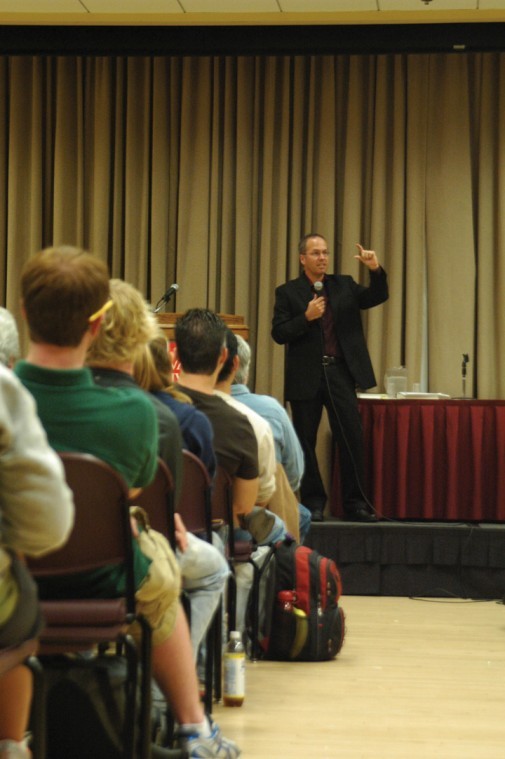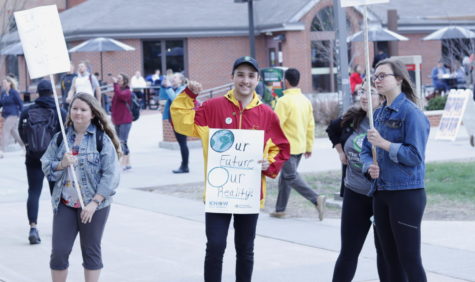Moral obligations brought to light concerning climate change
Photo: Abby Gilman/Iowa State Daily
Michael Nelson speaks at the environmental town meeting on Wednesday, Sept. 29 in the Sun Room of the Memorial Union.
September 29, 2010
Michael Nelson and Kathleen Dean Moore both share a purpose. Nelson, an associate professor of environmental ethics and philosophy at Michigan State University, and Moore, a distinguished professor of philosophy at Oregon State University, are both hoping to raise the level and quality of awareness about climate change.
Both are environmental authors and recently published “Moral Ground: Ethical Action for a Planet in Peril.” They hosted a discussion on the importance of taking personal moral responsibility for the planet Wednesday night in the Memorial Union.
“We know the facts, we understand the facts,” Nelson said. “[ISU] ActivUs has also done very heroic work, kind of arguing us to act or try to just act, but to the intense frustration of both scientists and activists, we don’t seem to act and we scratch our heads and wonder why.”
Nelson continued the discussion by stating people act on two premises: the first, he said, is factual, which is what scientists provide. However, Nelson stressed this “missing premise” which he and Moore call, “The Second Premise Project.”
“Moral Ground: Ethical Action for a Planet in Peril” which took three years to publish, is an outlet to speak for the world’s moral obligations.
They identified more than 120 of the world’s moral leaders, compiling everything from religious and spiritual leaders, philosophers, scientists and politicians. They requested nothing more than a 2,000 word essay, poem, prayer or proclamation — anything to answer whether humans have a moral obligation for the future.
They were flooded by responses, which resonated a powerful “yes.”
“Yes, we have an obligation to the future,” Moore said, reciting some of the responses received. “Yes, for the sake of the children. Yes, because justice demands it. Yes, because compassion calls us to it. Yes for the sake of human survival.”
Throughout the seminar, excerpts of essays were read aloud to the audience.
“People say ‘Why are you wasting your time with moral conversations?'” Moore said. “Moral concepts, values, moral principles, they don’t solve people’s problems, they don’t turn people’s minds. It’s money that motivates people, or it’s power that motivates people. But I really beg to differ. You look at the moral moxy that created the Declaration of Independence, we hold these truths to be self-evident.”
Nelson read an excerpt of his own, his moral obligation for the sake of a future without hope. He went into detail by saying,
“We search for our motivation to act and sometimes people act in desperation,” Nelson said. “Sometimes they do amazing, creative, and wondrous things. But sometimes, many times, they do not. I see that in my students nearly everyday, the desire to do good and just and beautiful things in the world, so easily squashed by some other student or professor, who flippantly points out that their individual decisions and actions do not make any real difference in the world. The student is gutted, mouth agape, no response at sight, so they give up before they start and I blame that on hope.”
He said he worries for people who use hope as motivation to heal our damaged world.
“I worry that hope is not only a throw away term, evacuees sentiments we dole out at the end of a paragraph or book or film or interview, but that it is dangerous and counterproductive. I want us to replace ‘I hope’ with ‘I resolve,'” he said.
Nelson and Moore are doing 20 town hall meetings, starting the same conversation.
The inspiration for Moore to write this publication was “the bewilderment, the absence of response to scientists. This information is present, it’s out there. We have to draw the conclusions from the scientific information. We’re trying to present this as a moral challenge.”
The two became involved within an organization Moore ran at Oregon State, and gathered all the environmental philosophers of the Midwest.
Moore stresses how we have lost our voices. Moore believes people are given “cheap substitutes for moral discourse” but worst of all, we don’t recognize these substitutions.
Moore also asserts we can justify the facts, but we can’t justify the values; but worst of all, we have deprived ourselves our right to speak our minds.
“We have this mistaken notion that because we have a right to think whatever we want, we don’t have a right to engage in discussion about disagreement,” Moore said. “So we have this kind of quietude in the face of difference, where we think maybe it’s bullying or it’s wrong to actually have real, heartfelt discussions about what we must speak.”

















